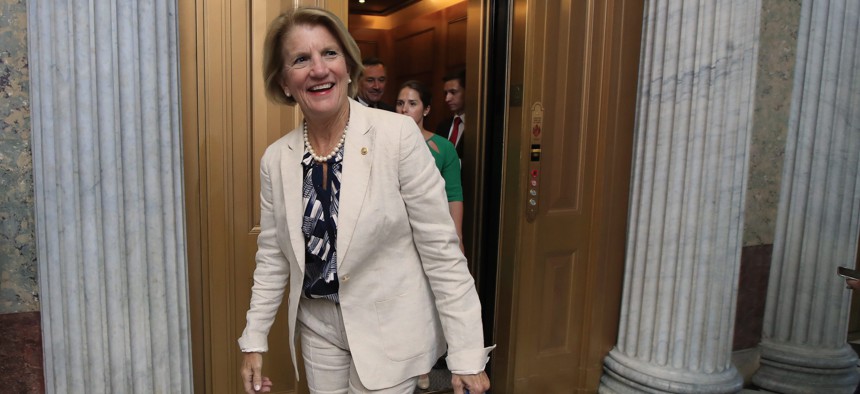U.S. Senate Approves Tax-Related Amendment State and Local Groups Oppose

Sen. Shelley Moore Capito, R-W.Va., walks towards the Senate floor on Capitol Hill in Washington, in July of 2017. AP Photo/Manuel Balce Ceneta
“This is a disappointment,” a lead National Governors Association staffer said of the measure, which could have implications for the state and local tax deduction.
WASHINGTON — U.S. Senate lawmakers on Thursday approved an amendment to their budget blueprint that appears to underscore an openness among Republicans in the chamber to restrict or eliminate the federal tax deduction for state and local taxes.
The so-called SALT deduction has become a flashpoint in the GOP-led effort to overhaul the U.S. tax code, a priority for President Trump. Passage of the amendment is a blow to state and local government groups that have been lobbying aggressively to preserve the tax break.
“This is a disappointment for state and local elected and appointed officials,” said David Parkhurst, staff director and general counsel in the National Governors Association’s office of government relations.
“We have our work cut out for us in the Senate," he added.
Sen. Shelley Moore Capito, a West Virginia Republican, sponsored the amendment, which lawmakers agreed to in a 52-47 vote. Other than one Democrat, Sen. Joe Manchin, also of West Virginia, all of the lawmakers who cast votes in favor of it were Republicans.
A counter-amendment from Sen. Maria Cantwell, a Washington Democrat, aimed at protecting the deduction, failed 47-52 in a similar party line vote.
Americans Against Double Taxation, a coalition that includes the U.S. Conference of Mayors, the National Association of Counties, the National Governors Association and other groups, issued a statement Thursday morning opposing Capito’s amendment.
Later in the day, the National League of Cities, also a member of the coalition, put out a statement condemning its passage.
The amendment was made to the fiscal year 2018 budget resolution the Senate was discussing. The Senate passed the resolution Thursday night, marking an important step in laying the groundwork for Republicans to carry out their planned revamp of tax laws.
Capito’s office did not respond to requests for comment about the amendment, or why the senator introduced it.
In remarks on the Senate floor Thursday, Capito argued the SALT deduction disproportionately benefits wealthy and high-income earners, with only 1 percent of the benefits from the tax break going to taxpayers who earn less than $50,000 each year.
She also said middle-income earners would benefit from other parts of the Republican tax plan, like lower tax rates.
Sen. Ron Wyden, an Oregon Democrat, said over half the taxpayers claiming the SALT deduction earn under $100,000.
He added that under the pending GOP tax plan taxpayers would “have one hand giveth and the other hand taking away,” with savings afforded under some provisions negated by other alterations to the tax code, like possible changes to SALT.
Eliminating the deduction could raise, by some estimates, $1.3 trillion over a decade for the federal coffers, a substantial sum that could go to help offset tax cuts for businesses and individuals that Republican lawmakers and Trump would like to see enacted.
Parkhurst called the Capito amendment language “squishy.” But said, in his view, it can be interpreted as instructional, effectively saying the Senate is open to reducing tax deductions in order to ensure the planned tax overhaul doesn’t worsen the federal budget deficit.
The amendment calls out the state and local deduction as an example of a deduction that could be reduced. But it does not explicitly say that it must be curtailed.
“Calling out SALT specifically sure strikes us as just a signal of the Senate’s willingness to at best modify, but at worst eliminate, state and local deductibility to offset the cost of tax reform,” Parkhurst said. “We always at the state and local level have proceeded as if we’re on the menu. And today’s vote confirms that SALT may be a main entrée.”
SALT supporters say getting rid of the deduction would amount to double taxation, with money households use to pay state and local taxes getting taxed federally. They also cite figures to dispute that the deduction mostly benefits wealthier Americans in Democratic states.
Some state and local officials are concerned that eliminating the deduction could make it harder for their own governments to impose future tax increases because residents could no longer claim a federal deduction for state and local tax costs.
PREVIOUSLY on Route Fifty:
Bill Lucia is a Senior Reporter for Government Executive’s Route Fifty and is based in Washington, D.C.
NEXT STORY: Weak Growth in State Tax Revenue Persists in 2017






